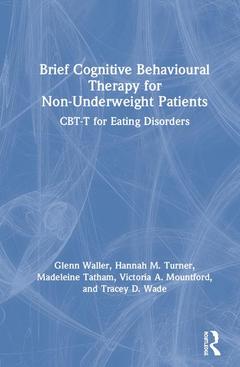Brief Cognitive Behavioural Therapy for Non-Underweight Patients CBT-T for Eating Disorders
Auteurs : Waller Glenn, Turner Hannah, Tatham Madeleine, Mountford Victoria, Wade Tracey

Most people with eating disorders struggle to find an effective therapy that they can access quickly. Brief Cognitive Behavioural Therapy for Non-Underweight Patients: CBT-T for Eating Disorders presents a new form of cognitive behavioural therapy (CBT) that is brief and effective, allowing more patients to get the help that they need.
CBT is a strongly supported therapy for all adults and many adolescents with eating disorders. This 10-session approach to CBT (CBT-T) is suitable for all eating disorder patients who are not severely underweight, helping adults and young adults to overcome their eating disorder. Using CBT-T with patients will allow clinicians to treat people in less time, shorten waiting lists, and see patients more quickly when they need help. It is a flexible protocol, which fits to the patient rather than making the patient fit to the therapy.
Brief Cognitive Behavioural Therapy for Non-Underweight Patients provides an evidence-based protocol that can be delivered by junior or senior clinicians, helping patients to recover and go on to live a healthy life. This book will appeal to clinical psychologists, psychiatrists, psychotherapists, dietitians, nurses, and other professionals working with eating disorders.
Foreword Chapter 1. The background to CBT-T and its evidence base Chapter 2. Principles of CBT-T, and how to apply them in routine practice Chapter 3. The CBT-T protocol checklist, and how to employ it Chapter 4. The critical first session Chapter 5. Phase 1 - Exposure, nutrition, and repairing the ‘broken’ cognitive link Chapter 6. Session 4 - Reviewing progress and deciding whether to continue Chapter 7. Phase 2 - Addressing cognitions regarding food, eating, and weight, using behavioural experiments and cognitive restructuring Chapter 8. Phase 3 - Working with emotional triggers and core beliefs Chapter 9. Phase 4 - Working with body image Chapter 10. Phase 5 - Relapse prevention Chapter 11. Follow-up as an active part of therapy Chapter 12. Patients’ experiences of CBT-T, and the roles of clinicians and supervisors References Appendix 1 – CBT-T Protocol checklist Appendix 2 - Basic diary sheet Appendix 3 - ED-15 questionnaire and scoring key Appendix 4 - Information sheet for patients and their families and friends Appendix 5 – REAL food guide for CBT-T (Susan Hart & Caitlin McMaster) Appendix 6 – Questionnaires to give the patient at each session Appendix 7 – Patient handout on emotions and beliefs that can trigger eating behaviours Appendix 8 – Extended food diary, assessing triggers to behaviours Appendix 9 – Template for therapy blueprint
Glenn Waller is a Professor of Clinical Psychology at the University of Sheffield, UK. He has a particular focus on the real-world effectiveness of cognitive behavioural therapy for eating disorders. He served on the development group for the 2017 NICE eating disorder guideline. He is a past President of the Academy for Eating Disorders, and is an Associate Editor for the International Journal of Eating Disorders.
Hannah M. Turner is a Consultant Clinical Psychologist at the Southern Health NHS Foundation Trust Eating Disorders Service, UK. Her interests include treatment effectiveness in community settings. She is a British Association of Behavioural and Cognitive Psychotherapy (BABCP) accredited therapist and supervisor. She served on the development group for the 2017 NICE eating disorder guideline.
Madeleine Tatham is a Consultant Clinical Psychologist at the Norfolk Community Eating Disorders Service, UK. She is a British Association of Behavioural and Cognitive Psychotherapy (BABCP) accredited therapist and regularly contributes to Clinical Psychology Doctorate teaching programmes in the UK.
Victoria A. Mountford is Principal Clinical Psychologist at the Eating Disorder Service, South London and Maudsley NHS Foundation Trust, UK. Her interests include early intervention, body image, and improving psychological treatment outcomes in the eating disorders. She is a British Association of Behavioural and Cognitive Psychotherapy (BABCP) accredited practitioner, supervisor, and trainer.
Tracey D. Wade is the Matthew Flinders Distinguished Professor of Psychology at Flinders University, Australia. She has served as President of the Eating Disorder Research Society (2017-2018) and is an Associate Editor for the International Journal of Eating Disorders. In 2016 she was made an Inaugural Honorary Fellow of the Australian Association for Co
Date de parution : 05-2019
15.6x23.4 cm
Disponible chez l'éditeur (délai d'approvisionnement : 14 jours).
Prix indicatif 148,11 €
Ajouter au panierDate de parution : 05-2019
15.6x23.4 cm
Disponible chez l'éditeur (délai d'approvisionnement : 14 jours).
Prix indicatif 35,19 €
Ajouter au panierThème de Brief Cognitive Behavioural Therapy for Non-Underweight... :
Mots-clés :
CBT Method; CBT Session; CBT-T; Completing Food Diaries; Non-Underweight Patients; Body Image Targets; cognitive behaviour therapy; Predict Weight Change; eating disorders; Maximum Recovery Rate; brief; Recommended Treatment Dose; evidence-based; Anorexia Nervosa; young adults; Meaningful Clinical Change; Unguided Self-help; Specialist Eating Disorders Services; Imagery Rescripting; Energy Balance; CBT; Enhance Patient Outcomes; Negative Body Image; Energy Graph; Negative Core Beliefs; Eating Disorder Service; Vice Versa; Therapy Blueprint; Behavioural Experiments; Cognitive Restructuring Methods; Body Image Work



